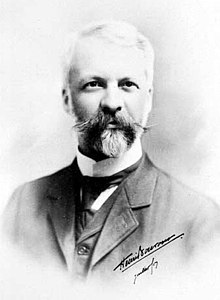
Back هنري بوراسا Arabic هنرى بوراسا ARZ Henri Bourassa French Henri Bourassa Polish Бурасса, Анри Russian Henri Bourassa Swedish
Henri Bourassa | |
|---|---|
 | |
| Member of the Canadian Parliament for Labelle | |
| In office 1896–1907 | |
| Preceded by | District created in 1892 |
| Succeeded by | Charles Beautron Major |
| In office 1925–1935 | |
| Preceded by | Hyacinthe-Adélard Fortier |
| Succeeded by | Maurice Lalonde |
| Member of the Legislative Assembly of Quebec for Montréal division no. 2 | |
| In office 1908–1909 | |
| Preceded by | Lomer Gouin |
| Succeeded by | Clément Robillard |
| Member of the Legislative Assembly of Quebec for Saint-Hyacinthe | |
| In office 1908–1912 | |
| Preceded by | Joseph Morin |
| Succeeded by | Télesphore-Damien Bouchard |
| Personal details | |
| Born | Joseph-Napoléon-Henri Bourassa September 1, 1868 Montreal, Quebec, Canada |
| Died | August 31, 1952 (aged 83) Outremont, Quebec |
| Resting place | Notre Dame des Neiges Cemetery |
| Political party | Liberal (1896–1899) Independent (1900) Liberal (1900–1908) Independent (1925–1935) |
| Other political affiliations | Ligue nationaliste |
| Education | Polytechnique Montréal College of the Holy Cross |
| Signature | |
Philosophy career | |
| Era | Philosophy in Canada |
| Region | Western philosophy |
| School | Nationalism, pacifism, social conservatism, ultramontanism |
Main interests | French Canadian nationalism, Canadian nationalism, Catholic social teaching |
Notable ideas | "Two founding peoples", language rights in Canada, Canadian autonomy, Canadian neutrality |
|
Preview warning: Page using Template:Infobox philosopher with unknown parameter "influenced" Preview warning: Page using Template:Infobox philosopher with unknown parameter "influences" | |
Joseph-Napoléon-Henri Bourassa (French pronunciation: [ɑ̃ʁi buʁasa]; September 1, 1868 – August 31, 1952) was a French Canadian political leader and publisher. In 1899, Bourassa was outspoken against the British government's request for Canada to send a militia to fight for Britain in the Second Boer War. Prime Minister Sir Wilfrid Laurier's compromise was to send a volunteer force, but the seeds were sown for future conscription protests during the World Wars of the next half-century. Bourassa unsuccessfully challenged the proposal to build warships to help protect the empire. He led the opposition to conscription during World War I and argued that Canada's interests were not at stake. He opposed Catholic bishops who defended military support of Britain and its allies.[1] Bourassa was an ideological father of French-Canadian nationalism.[2] Bourassa was also a defining force in forging French Canada's attitude to the Canadian Confederation of 1867.[3]
- ^ Rolando Gomes, "Henri Bourassa et l'Imperialisme Britannique (1899–1918)," Bulletin d'Histoire Politique (2008) 16#3 pp 161–182.
- ^ Susan Mann, Dream of Nation: a Social and Intellectual History of Quebec (2nd ed. 2003) pp 169–75, 205–25
- ^ Anctil, Pierre; Onu, Tonu, eds. (2016). "Do What You Must": Selected Editorials from Le Devoir under Henri Bourassa, 1910–1932. The Publications of the Champlain Society. p. 18. doi:10.3138/9781487514136. ISBN 978-1-4875-0187-7.